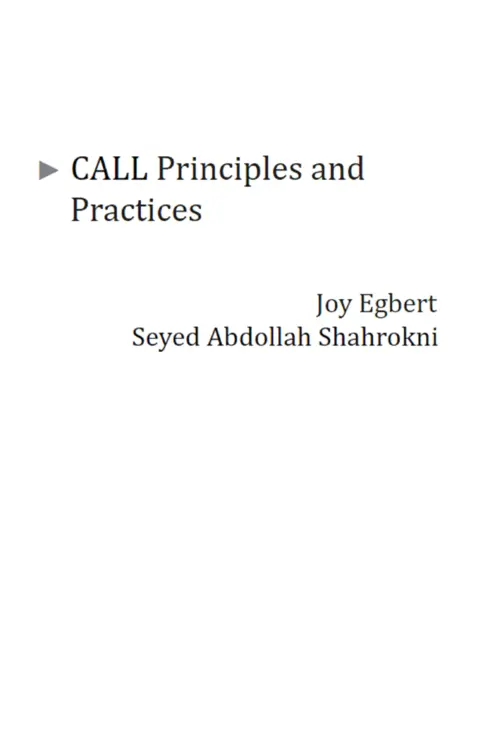
CALL Principles and Practices
No ratings
Joy Egbert, Washington State University
Seyed Abdollah Shahrokni, Texas A&M University
Copyright Year:
Publisher: Washington State University
Language: English
Formats Available
Conditions of Use
![]() Attribution
Attribution
CC BY
Table of Contents
- Front Matter
- I. Principles of CALL
- II. Developing and Practicing Reading and Writing Skills
- III. Developing and Practicing Listening and Speaking Skills
- IV. Communication and Collaboration
- V. Creativity and Production
- VI. Inquiry and Problem-Solving
- VII. Content-Based Instruction
- VIII. Assessment
- IX. Limitations, Caveats, and Challenges
- X. Teacher Development
- Back Matter
About the Book
This book takes as its organizing principles both the system of conditions that are known to support effective language learning and the goals that a variety of standards in the field have set out for us and our students, and what constitutes effective computer-enhanced pedagogy and why.
About the Contributors
Authors
Dr. Joy Egbert teaches courses in multilingual learners, foundations of education research, academic writing, media production, education technology, and computer-assisted language learning. Egbert is especially interested in language learning and technology use, specifically computer-assisted language learning (CALL). Egbert has taught ESL pre-kindergarten through adult, and she is certified K-12 in Idaho and WA state for computers and ESL, and at the secondary level for English and Russian.
Dr. Seyed Abdollah Shahrokni works in the exciting world of teaching and learning. He is currently the Open Publishing Platform Manager at Texas A&M University Libraries' OpenEd Division and the Managing Editor of TESL-EJ. He researches computer-assisted language learning (CALL), second language socialization (SLS) in online social spaces, especially massively multiplayer online games (MMOG), and Task Engagement.
